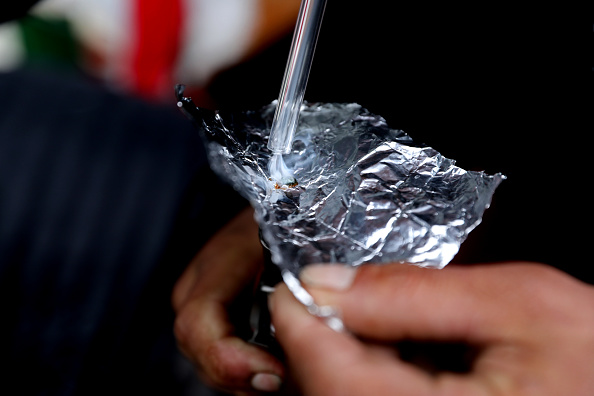Liquor stores in San Francisco's most troubled neighborhood are more than a place to buy booze and cigarettes for people living on the city's streets.
The sidewalks in front of some Tenderloin neighborhood corner markets serve as gathering places for people to use drugs and sell stolen goods. The shops also conveniently sell pipes, torches and anything else needed to use drugs late into the night.
This week, Mayor London Breed proposed legislation that would force markets in the Tenderloin to close after midnight, threatening $1,000 fines for every hour shops stay open after this curfew.
Breed has alleged these late-night retail shops in the Tenderloin are attracting illegal behavior and undermining the city's progress in breaking up drug markets. The curfew would be in place for one year under a pilot program if approved.
"Tenderloin residents, businesses, and workers deserve safe streets not just during the day, but also at night," Breed said in an earlier statement. "The drug markets happening at night in this neighborhood are unacceptable and must be met with increased law enforcement and new strategies."
Standing in front of Plaza Snacks & Deli at 77 McAllister St., Cole H., a fentanyl user who lives in the Sunset who declined to share his full name due to privacy concerns, said that while he lives far from the Tenderloin corner store, he comes there late at night to buy soda and "gabnails," a metal nail that, when heated, can turn fentanyl-laced "wax" into smoke he inhales to get high.
"I usually buy something to drink, paraphernalia," Cole said. "But I can't always buy it right away. Usually, I have to make a little money first," Cole added, admitting that he sometimes has to sell stolen goods to come up with the money to buy supplies to use drugs.
Outside the Los Primos convenience store at 147 Hyde St., Tenderloin resident and fentanyl user Derek Francis said he only buys soda, often Mountain Dew or other caffeinated soft drinks, from Tenderloin corner stores. While he knows Los Primos and other Tenderloin corner stores sell glass pipes, he thinks they are mainly novelty items that happen to be used to smoke drugs like fentanyl.
"Yeah, but they have those cylindrical pipes in corner stores across the country,” Francis said. "They have like little roses in them, like a gimmick."
The Standard witnessed a shopkeeper at Los Primos measure out and sell $3 strips of tin foil—used on the streets to smoke drugs.
Los Primos manager Aziz Mo admitted to selling the foil scraps at the store.
"We sell aluminum foil, but if we didn't, people would just get it from a store, from the shelf," Mo said. "If I don't sell it, they would just steal a whole roll from Target, Safeway."
Mo also admitted he sells bongs and pipes at Los Primos, as many as 60 a month.
"Like two or three a day," Mo said.
At Plaza Snacks & Deli, The Standard witnessed illegal street vendors ask for cardboard to sell their wares from.
Plaza Snacks & Deli co-owner Ray, who declined to share his last name, said he and his workers do not provide cardboard to illegal vendors.
“We never provide them anything,” Ray said. “We just collect whatever is left behind and recycle it at Pier 96."
Ray said drug paraphernalia—The Standard observed torches and butane tanks for sale—is "only 1% of the store."
"We make maybe $1,000 a month on that," Ray said, who would not say if he sells other supplies for drug use.
Some late-night street vendors have alleged that some shopkeepers around the neighborhood buy stolen products from street vendors to sell in their stores. Neither Plaza Snacks & Deli nor Los Primos was named by vendors as a shop engaging in this activity.
Both Ray and Mo denied stocking their stores with goods from illegal street vendors.
"That's a big no-no for us," Mo said.
"Hell, no," Ray said. "We have receipts. The city can come and inspect [the store] anytime. That’s a lie, and that’s accusing.”
Ray said he buys roughly $1,300 a week of dry goods like Pop-Tarts from a vendor, Pitco Foods, and showed a pile of receipts to The Standard. Ray said the most popular items in his store are milk and snacks like chips, soda, candy, cereal and pastries.
'It's a dumb law'
Shopkeepers and customers both said Breed's planned curfew is a waste of time.
"I don’t think they can really stop the illegal market here," Cole said. "I think it’s a dumb law."
Ray also thinks the plan is a waste of time.
"It’s not going to change anything. These people are homeless; they have nowhere to go," he said. "They should put more officers on the street, clean up the street and not blame the small businesses."
Drug user Francis said closing the stores early won't prevent people from gathering outside to sell and use drugs.
"People aren’t here for the store. They’re here for the drugs," Francis said. "She wants to cut down the stores' time, but it’s not their fault what we do.”
Francis said slashing store hours to try and get rid of drug users and dealers amounts to an about-face on drug policy by the city, remembering the ill-fated Tenderloin Center, which was known as a de facto safe drug use site before it closed in December 2022. The site reversed hundreds of opioid overdoses during the 11 months it was open.
"You encourage people to shoot up, and then you take that away," Francis said. "Everyone's still addicted."
